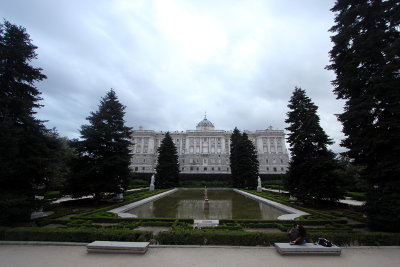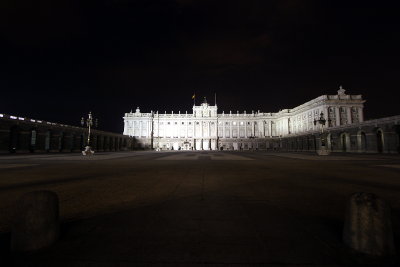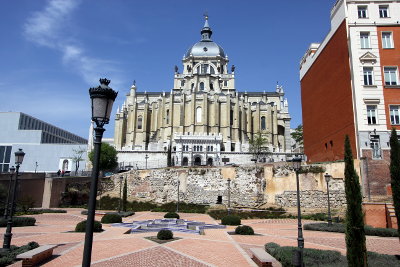Back in 2002, I was living in Ottawa working for a terrible company with some
really terrible people. One of these people, upom returning from a trip to
Madrid, went on at length about how scary and dangerous it was.
Oh Daniel, no one should ever go there. People ride around on scooters and
slash open your bags just to steal from you. Everywhere you look, there are
criminals!
Jodie was a horrible person, a racist, and an idiot, and yet I let her
depcition of this city poison me against it for more than a decade.
Thankfully though, I managed to ignore her just long enough to book a flight,
and I'm glad I did.
Madrid is a curious place. Like most European cities, it's very old, the
product of repeated wars over the centuries. The architecture is a mix
between traditional Muslim and French styles, but taller, with a gradiose,
almost Austrian influence. The city has managed to make itself both heavily
pedestrianised and car-friendly... it just depends on where you go.
There are a number of wide open public spaces, used for markets and restaurant
patios, chained together with a long series of pedestrian-friendly, walkable
malls. Everywhere you look there are bakeries, tapas bars, and churro cafés,
along with a (presumably new) littany of toursit-centric cuisine: doughnuts
and hamburgers.
I had four days in Madrid, so I took my time getting to know the city. I took
one of those fabulous Free Madrid city tours, where Ramón gave us all a
brief history of the city including the trading lands between the Muslims and
the Catholics, the Inquisition, and the Royal Family. I learnt about
Carlos the Bewitched and the slutty inclinations of Queen Isabella I.
If you've never been on one of these free tours, I can't recommend them
enough. I've never been disappointed and I never regret tipping well.
I spent a good few days just wandering the parks. Madrid has two primary
green spaces and at least a dozen other ones peppering the city. The
Parque del Retiro is the more traditional European park: manicured and
maintained as an open public space with fountains and statues everywhere, the
park is filled with the sounds of children playing, and buskers looking to
entertain. Young couples are everywhere, making out in the grass, and there
are tourists like me, wandering the park, camera in hand, shooting at
everything.
There's also a statue tribue to Satan there. Apparently it's the only one in
existence.
On the East side of the city is Casa de Campo, a massive park in the
style of Vancouver's Stanley Park only THREE TIMES THE SIZE. The former hunting
grounds of the Royal Family (and battle ground during the Spanish Civil War),
Casa de Campo has a lake, and a yacht club, and an acquarium, and a zoo, and
a gondola, and... I have no idea, because in an entire day, I could only visit
a fragment of it. My one regret from this visit was not spending more time
there. One of the locals told me that they've worked very hard to keep the
park diverse, with samplings of trees from all over the world.
My favourite memory from Madrid however has to be the flamenco performance &
dinner that I attended on Tuesday night. At no other time during my visit
were the multicultural origins of the city (and I suppose, Spain in general)
more apparent than when I sat at the foot of that tiny stage. Flamenco, it
would appear, is as our tour guide suggested of Spanish culture: "we take
other ideas, and keep what we like". The music is deeply layered, and
rythmically complex. The performance is effectively improvised between five
musicians and at least one dancer, making it a sort of "Spanish jazz" in
style. The cobbling together of artists is reflected in the clear connections
to foreign roots, specifically Muslim. It was almost like attending an
intimate call to prayer, but with a sense of shared joy and excitement.
And then there were the dancers.
Flamenco isn't so much a performance as it is a shared religious experience.
The dancer steps onto the stage and allows the music to fill them, proceeding
to do whatever feels natural. It's inspiring to watch and so difficult to
describe, but they're not dancing so much as serving as a vessel. Elizabeth
Gilbert explains this best in her TED talk, where she talks about how when
onlookers shout "Olé!", this is a way of invoking "god", that somehow, in
that moment, he is working through the performers. I didn't quite understand
her when I first heard this, but now it makes complete sense.
I'm now on a high-speed train on my way to Seville, enjoying a leisurely
210kph. I'm not sure if I'll ever return to Madrid, but I'm glad I took the
time to see it. As a Canadian, it's interesting to visit a place that has undergone a sort of multicultural experiment -- albeit unintentionally -- mingling Christian and Muslim, Spanish, French, and Austrian styles and traditions over the centuries. From where I'm sitting, it was a success.










